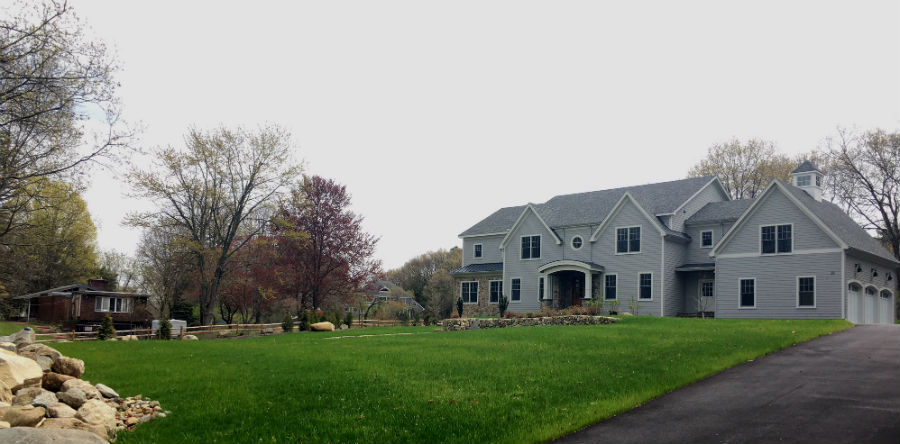
The house at 22 Bypass Rd. where McLean Hospital hopes to house clients age 15-21. The house on the adjacent 16 Bypass Road can be seen at far left.
By Alice Waugh
Bypass Road residents, including a member of the town’s Board of Health, are furious about a proposal by McLean Hospital to open a residential facility for teens and young adults in their neighborhood, saying they were given no opportunity to comment before Lincoln’s town counsel issued an opinion saying that the facility was exempt from the town’s zoning regulations.
Senior officials from McLean Hospital, a Belmont-based psychiatric hospital, met with Director of Planning and Land Use Jennifer Burney and Building Inspector Daniel Walsh in mid-April to present the proposal for properties the hospital purchased at 16-22 Bypass Rd. The 6,700-square-foot house at 22 Bypass Road would be used to house up to 12 clients age 15-21 “who are participating in a program designed to enhance the development of their life skills through educational and therapeutic training,” according to a follow-up letter to the Lincoln officials.
In the April 22 letter, McLean attorney Diane Tillotson made the case that McLean was entitled to an exemption from zoning restrictions as provided under state law for educational and religious organizations. The Bypass Road facility would be a “transitional living program providing psychoeducational support for young adults struggling with mood disorders, anxiety and depression” with a “curriculum integrating behavioral and cognitive skill building experiences,” she wrote.
Town counsel Joel Bard wrote in a May 2 letter to Burney that be believed the McLean proposal met the standard for a use exemption under Lincoln’s zoning by-law under Chapter 40A of state statutes, also known as the Dover Amendment. But about a dozen Bypass Road families vehemently disagree and have formed a group to fight the proposal by various means, including possibly filing a lawsuit.
“We feel blindsided,” said Dr. Steven Kanner, a primary care physician and Lincoln Board of Health member whose property abuts the Bypass Road site. “This is a life-changing event that could affect the safety of our children and grandchildren and our property values, and we were not even alerted? What kind of town are we living in? The arrogance [of town officials] not thinking we needed to know is astounding.”
The lack of specific information about the nature of the facility’s clients is worrisome, said Kanner, who was chief of medical care for the Massachusetts Department of Mental Health during the Dukakis administration.
“I’m certainly not against mental health, but this is something where we don’t know who these people are,” Kanner said. “Are they male or female? How do we know they’re not dangerous? These are disturbed adolescents who have been highly depressed and may have been violent.” If one of them escaped, he added, “there’s nothing to stop them from being in someone else’s yard within 90 seconds.”
The neighborhood group is arguing that the facility is medical and not educational and thus does not qualify for a zoning exemption. “No one has explored why this qualifies as educational… this is medical treatment,” Kanner said. “Are they getting any education? I doubt it.”
On behalf of the neighborhood group, Kanner has been speaking with attorneys. “It appears the only way we can get a hearing we should have been accorded by right is to sue,” he said.
Also at issue is whether the current septic system is adequate for the proposed use, because local septic regulations must be followed even for educational and religious institutions. Burney noted on a town web page about the project that the Board of Health and the Water Department will be consulted about septic and water issues.
McLean Hospital already operates the Lincoln Residence, a transitional residence for adults in Lincoln at 5 Old Cambridge Turnpike. In addition, the Lexington-based Edinburg Center operates is a home for developmentally disabled adults at 15 Bypass Road across from where McLean hopes to locate.
In the April 22 letter, McLean officials said they would hold a neighborhood meeting in mid-June with an anticipated opening date in September 2016.